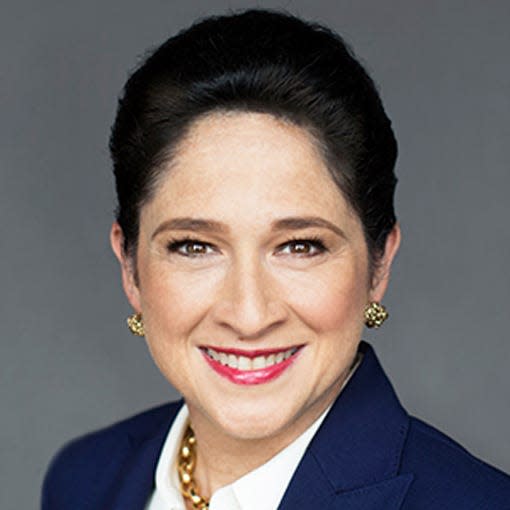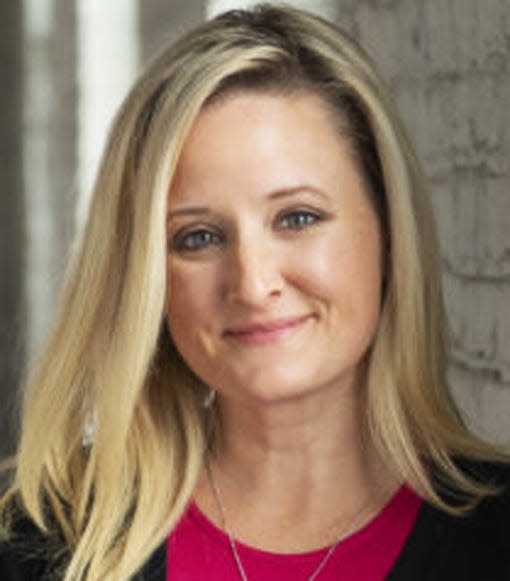No contested races for Illinois comptroller or treasurer. Here are the candidates
- Oops!Something went wrong.Please try again later.
The primary election for Illinois treasurer and comptroller have no contested races. Two Republicans and two Democrats are seeking their party's nod for the General Election in November. Susana Mendoza, a Democrat, is the incumbent for the Comptroller position. Opposing her in November will be Shannon Teresi, the GOP candidate.
For Illinois treasurer, incumbent Michael W. Frerichs has no opposition for the Democrat primary and Tom Demmer has no opposition on the Republican side.
Candidates were asked three questions via email. Their bios and responses are included. Demmer did not respond to questions.
One Republican and one Democrat for comptroller

Susana Mendoza, Democrat
Age: 50
City of residence: Chicago
Education: Bolingbrook High School (1990)Truman State University (B.A. in Business Administration, 1994)
Work experience: IL State Representative, HD-1 (2001-2011)Chicago City Clerk (2011-2016)IL Comptroller (2016-present)
Political experience: IL State Representative, HD-1 (2001-2011)Chicago City Clerk (2011-2016)IL Comptroller (2016-present)
Organizations and memberships: Hispanas Organized for Political EqualityAspen Institute Rodel Fellow
Family: Husband David and son David

Shannon Teresi, Republican
Age: 38City of residence: Crystal LakeEducation: Northern Illinois University (2007) Masters in Accounting (2006) Bachelors in Science for AccountingMcHenry County Community College (2004) Associates in ScienceMarengo Community High School (2002) Diploma
Work experience: McHenry County Auditor’s Office (Current - 2018) McHenry County Auditor(2018 - 2016) Financial Reporting Manager / Chief Deputy Auditor(2016 - 2010) Internal AuditorPriceWaterhouseCoopers (2010 - 2007) Associate (2006 & 2005) Intern
Political experience: McHenry County Auditor, Republican Precinct Committeeman
Organizations and memberships: Certified Public Accountant with IL CPA Society, Certified Fraud Examiner with Association of Certified Fraud Examiners, Certified Internal Auditor with Institute of Internal Auditors, and Certification in Risk Management Assurance and Membership with Government Finance Association, president of IL Association of County Auditors
Family: Husband, Ross, and two sons, Chase and Luke
How to handle paying state's bills?
What policies would you push for to prevent a backlog of unpaid bills, which previously eroded the state’s financial reputation?
Teresi: The state's liabilities have overall significantly increased under Gov. Pritzker and Mendoza. They have taken on more loans to pay unpaid bills, so they have provided no real reform. It is like paying one credit card, but taking out five more. They have used federal dollars to address their mismanagement vs. impacting taxpayers' day-to-day lives. We are walking off a financial cliff, which Moody’s warned could happen with a recession.
My record shows that I have put systems in place in McHenry County to pay the bills on time, be transparent about what is being paid, and cutting out corrupt practices leading to wasted taxpayer dollars. On my watch, McHenry County has maintained a AAA bond rating and now we have no debt. McHenry County has more equity (net position) than the state of Illinois because of sound financial practice. With that experience, I will work to ensure that taxpayers know exactly what their tax dollars are paying for.
Mendoza: My policy of methodically paying down the bills over the past six years is restoring Illinois’ financial reputation and helped earn Illinois six credit upgrades, the first in 20 years after eight credit downgrades under the previous administration. When I stepped into office in 2016, our bill backlog had reached $16.7 billion thanks to fiscal mismanagement. I immediately began targeting the most important bills to pay; to those who care for the state’s most vulnerable — and especially bills that get a federal match. The governor fought me on a plan to refinance bills we were paying 12% interest on with bonds we got for 3.5%. I used the federal match to pay $9 billion in high-interest bills with that $6 billion in low-interest bonds. That action saved Illinois taxpayers $4-6 billion in late payment interest penalties. I kept paying down those bills and that state now has an Accounts Payable representing the cost of doing business of just under $3 billion. The best way to prevent another bill backlog is to re-elect the Comptroller that paid it down in the first place.
17th Congressional District Rep.
More: Where six Democrats for Congress stand on guns and economy
More: Meet the Republicans running to flip US Rep. Cheri Bustos' seat red
Adding transparency and accessibility to office
What would you do to add transparency and accessibility of state financial records to Illinois residents?
Mendoza: You can look at the policies I have enacted over the past six years — a transparency revolution. I advocated tirelessly to successfully override Gov. Rauner’s veto of my landmark Debt Transparency Act, the most significant reform bill in the history of the comptroller’s office. It requires monthly, rather than yearly, reporting from state agencies to the comptroller on the amount of bills being held at state agencies, how old they are, and estimated accrued late-payment interest penalties. I then built upon the successes of the DTA with the Truth in Hiring Act — a transparency reform that ends the deceptive practice of governors hiding governor staff salaries within other state agencies’ budgets to mask the true cost of the governor’s budget. My Truth in Budgeting Act requires governors to address in their budget proposals how they will pay down state debt. My Vendor Payment Transparency Act requires disclosure reports from private lenders who loan money to state vendors. Another bill I championed requires more disclosure by Tax Increment Financing districts around the state. Transparency and accessibility have been top priorities of mine since taking office, and they will continue to be moving forward.
Teresi: Illinois' consistently late financial reports need to be addressed. We are in the 11th month since the end of FY2021 and the Comptroller’s office still has yet to release the ACFR. In states with strong financial leadership, those reports are released in their entirety within 6 months. Sometimes states receive an extension, but not every year. Not here. In Illinois, legislators crafted a budget based on a 5 page interim report instead of being able to look closely at where our financial struggles are at their worst and working to reform from there. We can’t stand by and say ‘that’s the way it’s always been’ when Illinois remains one of the highest taxed states in the country, has the worst credit rating in the country, and continues to spend more than we take in.
Illinois Senate, 36th District
More: New district for Galesburg means new state senator; Here are 36th District GOP candidates
Combine comptroller and treasurer positions?
Some state officials have called for combining the comptroller and treasurer positions. Is this a good idea?
Teresi: Saving the Illinois taxpayer money is paramount, and I stand with my fellow candidate Tom Demmer who proposed combining the two offices earlier this year. During my time as McHenry County Auditor, I’ve proven that systems can be put in place to protect the independence of offices responsible for stewardship of taxpayer dollars. We’ve stopped practices in McHenry County like printing promotional materials for politicians with taxpayer dollars, something that Comptroller Mendoza is currently planning to do with rebate checks.
Mendoza: No. There are very good reasons the drafters of Illinois’ 1970 constitution created the comptroller and treasurer as independent offices to serve as a check and balance on each other and the governor’s office to safeguard Illinois’ financial interests. A Republican from Dixon, Illinois, committed the largest government embezzlement scandal in US history by using the city’s combined comptroller/treasurer office to steal over $53 million from honest taxpayers in Dixon back in 2010. Before Dixon, the largest government embezzlement scandal in US history was committed by Illinois Auditor of Public Accounts Orville Hodge in the 1950s to the tune of over $60 million by today’s standards. He was then Illinois’ combined Comptroller-Treasurer. To prevent future corruption, the responsibilities of the office of the Auditor were divided between the Comptroller and the Treasurer’s office. Keeping these offices separate protects Illinois taxpayers’ money, strengthens our state’s credit rating, and holds our government accountable. Illinois taxpayers cannot afford another Orville Hodge. Illinois taxpayers cannot afford another Rita Crundwell.
Illinois Representative, 71st District
More: Daniel Swanson challenged by Matthew Rauschert in District 71 GOP primary election

One Republican and one Democrat for treasurer
Michael W. Frerichs
Age: 48 City of Residence: Champaign Education: Rantoul High School, 1991 Yale University, BA 1995 Work experience: Managing Director of SmartStructures and Civil Engineering Company Teacher, Rantoul Township High School Political experience: Champaign County Board Champaign County Auditor State Senator Illinois State Treasurer (2015 – Present) Organizations and memberships: Incoming President of the National Association of Auditors, Comptrollers, and Treasurers Treasurer of the National Association of State Treasurers Family: Wife – Erica, Daughter – Ella
How to improve return of unclaimed property
The state currently holds $3.5 billion in unclaimed property. What would you do to increase the number of successful claims made on that unclaimed property and return it to its rightful owners?
Frerichs: In 2015 I inherited an unclaimed property law that was passed in 1961 and a paper-based system for claiming your money. With help from the General Assembly, we modernized Illinois' unclaimed property law. And we updated our processes to utilize modern technology to make claiming your money faster and easier. As a result, under my leadership the State Treasurer's office has returned over $1.4 billion and paid out over one million claims — more than any other Treasurer in Illinois history. One in four adults who search our website (icash.illinoistreasurer.gov) find something and the average claim is $1,000.
Additionally, as state treasurer I fought to ensure that life insurance companies pay the benefits they owe. Auditors working for my office have found over $800 million in unpaid life insurance benefits owed to Illinois beneficiaries. Now a new law requires insurers to notify beneficiaries after their loved one passes away.
More: GOP primary candidates line up to challenge incumbent Democratic Sen. Tammy Duckworth
Ensure return on Illinois investments
What would you do to ensure a reliable return on investments on behalf of Illinois, particularly as yield rates have remained low since the onset of the COVID-19 pandemic?
Frerichs: Every dollar earned by the state treasurer is a dollar that does not have to be raised in taxes or cut from funding for essential services in your community. Under my leadership the Illinois Treasurer's Office has earned more than $1 billion for taxpayers and been awarded the top AAA rating for the Illinois Funds investment pool. This was accomplished by (1) better coordination of cash flow needs with the governor and comptroller to better calibrate the weighted average maturity of the state portfolio, (2) bipartisan changes to state law allowing more diverse investments, including highly rated corporate bonds, and (3) a professional investment team (when awarding their top Gold rating for the fifth time in 2021, independent analyst Morningstar said “the state of Illinois touts a strong investment team”). In 2022, however, we expect that interest rates will again rise in response to the Federal Reserve’s actions.
Reforms to state's college savings program
As cost of college continues to rise, what reforms or improvements need to be made to the state's college savings programs, Bright Start and Bright Directions, to meet these increasing costs?
Frerichs: In 2015 I inherited a College Savings program rated among the lowest in the nation. We changed providers, cut management fees by nearly 50%, and provided more investment options to families. As a result, not only have families saved over $100 million in fees since 2015, but independent analyst Morningstar improved their rating for the Bright Start college savings program from among the worst to literally tied for first in the nation. Bright Start has now received the top Gold rating for five consecutive years. And Illinois’ Bright Start and Bright Directions college savings pool has more than doubled from $7 billion in 2015 to over $17 billion in assets with approximately 750,000 accounts today. As Morningstar explained in 2019, Illinois has “excellent state oversight and program management, best-in-class investment options, and thoughtful investment philosophy… (and) stayed ahead of their peers by innovating in areas where most 529 plans aren’t …”
Gubernatorial questionnaires:
Pension burden: What's your plan to improve the pension burden on cities?
Population increase: How would you work to increase the state's population?
Health care: How will you bring down health care, prescription drug costs?
COVID-19: How would you handle another surge in COVID deaths?
Illinois small businesses: Illinois governor candidates: What help do small businesses still need due to pandemic?
This article originally appeared on Galesburg Register-Mail: Comptroller, treasurer candidates face no Illinois primary opposition
